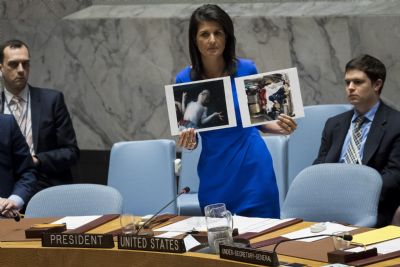Unable to change the official topic for April's Israel-bashing session, Council President Haley has circulated a "concept note" recommending that the Council redirect its attention away from Israel to real MidEast criminals. The other 14 members of the Security Council, however, are free to ignore her suggestions given the official subject matter hasn't changed.
Haley's "concept note" to her fellow Council members states:
"Multiple conflicts throughout the Middle East have left hundreds of thousands of people dead and millions displaced. The cross-border influx of foreign terrorist fighters has added complexity to an opaque network of terrorist groups with ever-shifting alliances that threaten international peace and security in the region and the world. In Iraq, the Government continues to whittle away at territory controlled by ISIS around Mosul, while the difficult work of reconciliation and reconstruction has only just begun in earnest. Meanwhile, some states continue to sponsor terrorist groups or other militias that are fomenting unrest throughout the region. Hizbullah, for example, remains a terrorist group that not only undermines Lebanon's security, but also plays a key role in enabling the Syrian conflict and providing advice to other terrorists and extremists in the Middle East. In Libya, political factions are struggling to reach a political solution to the country's ongoing political and security crisis, which will hinge on effective United Nations involvement. The Security Council addresses a number of conflicts on a regular basis, but all too often loses sight of the interplay among conflicts and the role of some actors in fomenting and benefiting from conflict throughout the region.
The quarterly open debate provides an opportunity for Council members, Member States and others to examine the conflicts in the Middle East through a broader lens and address what they view as the most serious issues of international peace and security in the Middle East.
Briefer
The United Nations Special Coordinator for the Middle East Peace Process, Nickolay Mladenov.
Key questions
Members of the Security Council, Member States and others participating in the open debate are encouraged to think in terms of regional and global contexts, with international peace and security at the core of their observations. Key questions to address will include:
- Who are the regional players that most benefit from chaos in the region, and what are the connections between terrorist groups and these states?
- What steps can be taken to identify and address threats to international peace and security?
- How can the international community work to ensure that bad actors do not benefit from post-conflict reconstruction efforts?"

